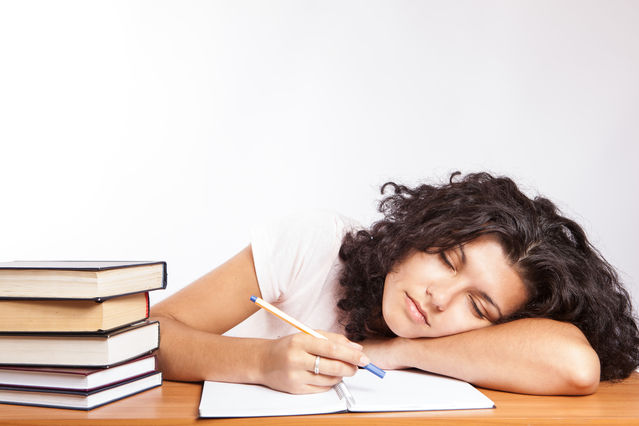
Source: CollegeDegrees360/Flickr
It’s every student’s dilemma. Should you keep studying and delay your bedtime, or shut the books and hit the hay?
In college, I regularly stayed up until midnight or 1 a.m. studying and writing lab reports, even though my alarm went off at 5 a.m. each morning for rowing practice. It was always so tempting to stay up late when there was just so much work to be done. So much work, all the time.
Although running on four or five hours of sleep in college let me finish a lot of work and studying, I was sleepy. I found myself nodding off during class, eating more food to keep myself awake, and I became more susceptible to catching colds. I found it harder to study because I hadn’t paid attention well in class. On occasion, I didn’t do as well on tests as I would have liked to. Sometimes I even found myself being short-tempered toward my friends.
Sound familiar?
These days, after working in a sleep research laboratory for the past four years and becoming intimately acquainted with what the research says about sleep curtailment, I am much more inclined to shut the books, close my laptop, and crawl into bed.
In short, there are literally no benefits—none, zip, zero, nada—to depriving oneself of necessary sleep.
What does sleep deprivation do to my body?
- Just one all-nighter alters your immune system’s functioning, similar to the waystress does. The peak concentration of white blood cells’ diurnal rhythm issignificantly reduced after one night of sleep deprivation, making us more vulnerable to illness and infection.
- A single night of sleep deprivation results in increased blood pressure, and even a half-night of sleep loss can have the same effect for individuals who are hypertensive or prehypertensive, suggesting activation of the sympathetic system.
- Our body experiences many unique endocrine changes during sleep related to growth and thermoregulation, which become disrupted when sleep is curtailed.Satiety hormones, like leptin and ghrelin, are also altered, which may result in increased hunger and weight gain.
- One week of mild sleep restriction (six hours per night—a pretty typical schedule for most people, right?) causes increased secretion of proinflammatory cytokines, which can contribute to cardiovascular and neurocognitive dysfunction. Recovery sleep on the weekends lowers these inflammation levels.
- One week of six hours per night is associated with a change in the transcription ofover 700 genes, many of which are implicated in the body’s circadian rhythms, oxidative stress, and metabolism.
What does sleep deprivation do to my brain?
- One night of total sleep deprivation reduces the coordination and speed of our ability to eye-track, as assessed in a study that simulated driving ability after insufficient sleep.
- In the same study above that found an increase in cytokines with modest sleep restriction for one week, it was found that three nights of recovery sleep (10 hours per night in bed) was not sufficient to reverse deficits in attention and reaction time, as measured by a simple computer task.
- Taken together, many studies have concluded that chronic sleep loss is associated with deficits in both short- and long-term memory, memory formation, decision-making, and attention/vigilance.
How can I tell if I’m getting enough sleep?
This is a test called the Epworth Sleepiness Scale. If you add your total score (out of a maximum of 24 points), you can get a sense for how sleepy you are, subjectively. For reference, the average person scores around four or five.
There’s also an objective test of daytime sleepiness in which an individual is given several 20-minute nap opportunities throughout the day. The lower the sleep latency, the greater the “sleep need.”
But sometimes you DON’T feel like you could actually fall asleep during the day, yet it’s still clear you aren’t getting enough sleep. Do you find it difficult to get out of bed in the morning? Feel you need coffee to start your day? Find yourself yawning frequently? Feel sluggish, unmotivated, inattentive, or foggy-headed? Find yourself getting sick more often, or unable to perform as well in the gym? You’re probably running on too little sleep.
I have a test the next day, and I’m too stressed to fall asleep. What can I do?
- If you absolutely must study in the hours before bed, make sure that you’re not studying in bright light. Light, especially in the blue wavelength, suppresses the secretion of melatonin, a hormone synthesized by the pineal gland that prepares your body for sleep. Computer, tablet, and phone screens are the worst culprits for blue light exposure onto the retina. Consider downloading the program f.lux, which automatically softens your computer screen’s brightness at sunset. You can also try donning a pair of orange glasses to filter out blue light (and read about the experiment I did on myself here!) Try to limit bright light exposure at least one hour before bed.
- Consider deep breathing and mindfulness techniques to relax. I keep a meditationMP3 and a pair of earbuds by my bed every night, just in case. Even on my most stressful nights, following along with the voice’s commands is extremely helpful in relaxing me.
- Associate your bed with sleeping only. Don’t study in bed. If you’re lying in bed paralyzed with stress and can’t fall asleep, get out of bed and find a quiet activity until you’re ready to try again. Associating your bed with insomnia will only make you dread bedtime even more each night.
- If your insomnia is chronic (more than three times per week for at least three months), consider seeing a sleep specialist. They may prescribe you a medication that can suppress your body’s stress system, or refer you to a cognitive-behavior therapy specialist for treatment.
So…should I stay up an extra hour studying, or give myself an extra hour of sleep?
I don’t think this question needs answering anymore! Physical effects aside, sleep loss makes it difficult to learn, pay attention, and memorize information. Studying late at night, to a degree, becomes counterproductive; delaying sleep cuts into our precious slow-wave sleep stage, which is associated with reduced cortisol levels and memory consolidation.
You get one body and one brain in life. Give them enough sleep—it’s the single best thing you can do to perform and feel your best every day.

